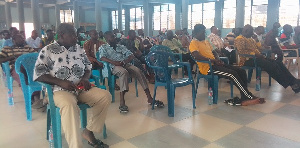 Participants at the sensitization program
Participants at the sensitization program
The government has been reminded to expedite actions on the passage of the bill on non-custodial sentencing into law.
The Crime Check Foundation in a series of engagements with some assemblies under a project dubbed ‘Decriminalizing Vagrancy Laws and Advocacy’ (DVLA) in the Greater Accra and Central regions, and assembly officials admitted that the passage and implementation of the Community Service Bill will help them in dealing with sanitation challenges in Ghana.
In view of this, an Environmental Officer with the Awutu Senya Municipal Assembly, Joseph Mensah while speaking to journalists on the sideline of the DVLA sensitization program, asserted that a non-custodial form of sentencing will help the assemblies to cut down its expenditure in that regard.
“If you look at our country and the economic situation we are in, the majority of the people we prosecute do not have the court fine; when they don’t get the fine, they go to jail.”
The Environmental Officer who plays a key role in the enforcement of the assembly’s by-laws called on Ghanaians to push lawmakers to amend the law to accommodate community service.
“What we need to do as Ghanaians is that we have to push parliament to pass that law (non-custodial sentencing); because we cannot make our by-laws outside the mother laws. Every law that we make must conform with the mother law that’s in existence, if the mother cannot allow us to go to court to get non-custodial sentencing, we cannot do it. If that law is passed, it makes it easier for all of us,” Joseph Mensah said.
Vice President Mahamudu Bawumia while speaking at a ceremony at the Ghana Prisons Service in August 2020, after years of many calls, announced that the government completed drafting the Non-Custodial Sentencing Bill but Ghana is yet to see it being passed into law.
The Bill, when promogulated into law, would provide Alternative Sentencing such as probation, parole, and community service into the country’s Criminal Justice System.
The alternatives to a custodial sentence which is being pushed by the Crime Check Foundation and Open Society Initiative for West Africa (OSIWA) through the DVLA project held great potential to decongest the country’s inhumane Prisons and significantly reduce the financial burden in the management of the prison system.
Concerns from vagrants
Meanwhile, some vagrants in the Awutu Senya Municipal Assembly have called on the assembly to fulfill its responsibilities by providing basic needs including property drainage systems, markets, among others to boost economic activities in their area.
The participants who were selected from 6 zonal areas were made of traders’ unions, waste collectors, petty traders, truck pushers, landlords, unit committee members, among others.
The Decriminalizing Vagrancy Law and Advocacy project was initiated as a result of the harsh District Assemblies’ by-laws, which usually bite poor people harder by sending them to prison.
The Executive Director of Crime Check Foundation, Ibrahim Oppong Kwarteng throughout the series of sensitization programs in five municipalities in the Greater Accra and Central regions admonished the participants to desist from challenging the authority of the assemblies by deliberately flouting its bylaws.
“We are here to teach you about your rights, what the assemblies need to do is to better your lives but also ensure that you have a role to play in the development of your community; you must obey the bylaws and comply with the assembly,” he stated.
Mr. Oppong Kwarteng further made it clear that the DVLA program is not meant to incite vagrants against the assembly but to make them aware of their rights and responsibilities for national development.
Metropolitan, Municipal and District Assemblies (MMDAs) pass by-laws such as fines and penalties which these vagrants are unable to pay and end get thrown into prison.
Vagrants are persons who wander around due to homelessness and make a living by hawking or begging on the streets.
Besides, the CCF and OSIWA through the Decriminalizing Vagrancy Laws And Advocacy (DVLA) are proposing fairness in the application of laws as well as using Alternative Dispute Resolution (ADR) to decongest Ghana’s choked prisons while educating the vagrants on their rights and responsibilities.
Meanwhile, the District Director of the National Commission for Civic Education, NCCE, Cephas Kofi Agboada educated vagrants on the need to know their rights and responsibilities adding that this will drastically make Ghana the most peaceful country.
The beneficiary municipalities from the advocacy project so far are the Accra Metropolitan, Ashaiman Municipal, La Nkwantanang Madina Municipal, and Weija Gbawe Municipal and Awutu Senya Municipal assemblies.
Project Timeline
The one-year project will be rolled out in 12 metropolitan assemblies in three regions: Greater Accra, Ashanti, and Central.
It will sensitize 1200 vagrants about their rights and responsibilities to prevent any misunderstandings with the assemblies.
Monitoring and Evaluation
To monitor the progress and effectiveness of the Decriminalizing Vagrancy Laws and Advocacy project, a contact center will be created after the sensitization to address the concerns of vagrants at the partnering organization, Crime Check Foundation.
The project will run from May 2021 to May 2022.